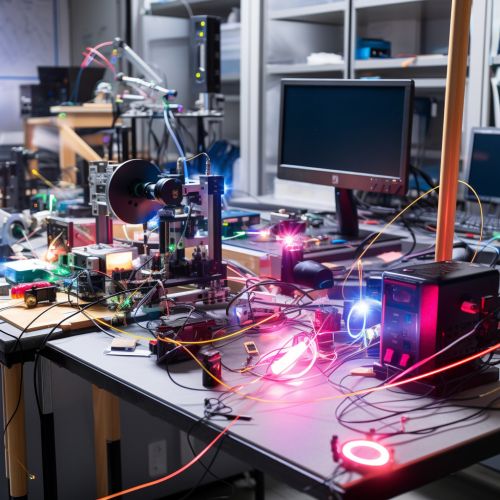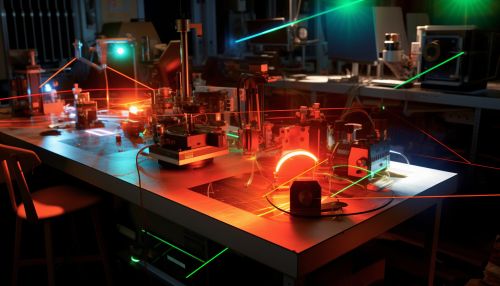Quantum Key Distribution (QKD)
Introduction
Quantum Key Distribution (QKD) is a method used in quantum cryptography for secure communication. It enables two parties to produce a shared random secret key known only to them, which can then be used to encrypt and decrypt messages. The security of encryption using QKD is based on the fundamental principles of quantum mechanics, rather than on assumptions about the computational resources of an attacker.


Principles of QKD
The principles of QKD are rooted in the laws of quantum mechanics. In particular, the no-cloning theorem and the Heisenberg Uncertainty Principle play crucial roles in ensuring the security of QKD.
The no-cloning theorem states that it is impossible to create an identical copy of an arbitrary unknown quantum state. This means that an eavesdropper cannot make a perfect copy of the key without the legitimate parties knowing.
The Heisenberg Uncertainty Principle, on the other hand, states that certain pairs of physical properties, like position and momentum, cannot both be accurately measured simultaneously. In the context of QKD, this means that an eavesdropper cannot measure the quantum states used to form the key without disturbing those states, which can be detected by the legitimate parties.
QKD Protocols
Several QKD protocols have been developed since the inception of quantum cryptography. The most well-known of these is the BB84 protocol, named after its inventors Charles Bennett and Gilles Brassard, who proposed it in 1984. Other notable protocols include the Ekert protocol, the B92 protocol, and the Differential Phase Shift QKD.
Each of these protocols has its own strengths and weaknesses, and the choice of which to use depends on the specific requirements of the communication scenario.
Security of QKD
The security of QKD is based on the principles of quantum mechanics, rather than on computational hardness assumptions. This means that, in theory, QKD can provide security against any attacker, even one with unlimited computational resources. However, in practice, the security of QKD can be compromised by various factors, such as imperfect equipment, side-channel attacks, and implementation errors. Therefore, it is crucial to carefully design and implement QKD systems to ensure their security.
Applications of QKD
QKD has a wide range of potential applications, particularly in areas where high levels of security are required. These include secure government communications, financial transactions, and critical infrastructure protection. QKD can also be used to secure communication in quantum networks, which are networks that use quantum states for communication.
Future of QKD
The future of QKD looks promising, with ongoing research and development aimed at improving the performance and security of QKD systems, and at integrating them into existing communication infrastructure. One of the main challenges in this regard is the limited range of QKD, which is currently restricted to a few hundred kilometers due to the loss of quantum states in transmission. However, research is underway to overcome this limitation, for example through the use of quantum repeaters or quantum satellites.
